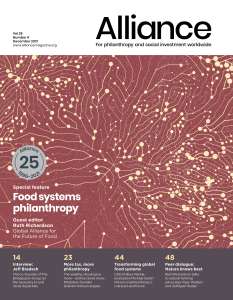How could our food system transform to maximise planetary, human, and animal wellbeing?
The problem. Our food system is incompatible with the United Nations Sustainable Development Goals (SDGs). In Europe, increasing production and excessive promotion of extractive animal-sourced foods form a significant part of this problem.
Could change be possible in Europe? Over 2021, the Healthy Food Healthy Planet (HFHP) Initiative brought together a variety of funders and European civil society from across different sectors (health, food, climate change, biodiversity, animal welfare, labour rights, and just transitions) to co-create how we might change this. This work is beginning in Europe not only because of the scale of the problem in the region but also because Europe and other wealthy nations must act first on food to set a global example.
A sustainable, healthy, and equitable food system is possible. The outcome from HFHP’s co-creation was a strategic framework demanding healthy, just, and sustainable food environments, starting with rebalancing animal-sourced foods across Europe. This framework has identified a range of integrated levers that have the potential to make food environments begin to work for, instead of against, societal objectives.
What are food environments? Food environments are the economic, political, and socio-cultural contexts that guide people’s engagement with the food system and decisions around consuming food. When challenged by civil society and governments, dominant companies often like to frame food environments as “consumer choice.” In reality, those environments have been very carefully designed to meet their business goals. Their work has normalised excessive consumption of animal-sourced foods across European countries. The European Food Policy coalition recently published a think piece on food environments.
How can improving food environments help? Healthy Food Healthy Planet supports breaking free from harmful food environments because they:
- are an important entry point to drive food system change due to their position between producers and consumers.
- shape people’s decisions about food by determining what is available, accessible, affordable, and desirable.
- influence producers in the supply chain through the products they are willing to procure, the prices they are willing to pay, and the standards they are willing to accept.
- have been, to date, largely neglected by funders in the food space.
Civil society will increasingly demand that healthy, sustainable, and just food environments are normalised, reducing costs currently outsourced to people, health services, animals, and environmental cleanups.
Breaking down silos to changing food environments. One of the major challenges identified on food has been the start/stop nature as potential solutions are implemented, but then face challenges. For example, under pressure from climate activists, companies and governments have trialled food changes designed from a pure climate lens. But some of these changes have then been opposed by health advocates and vice/versa. Solutions that meet multiple issue needs are far more likely to be implemented and scaled at speed. There will still be disagreement and tension, but the HFHP vision sees a clear path for a future for animal-sourced foods in Europe positively contributing to society’s goals.
A shared agenda accelerates action. The co-creation approach showed us that when it comes to excessive European animal-sourced foods consumption, there is a shared agenda across these issue priorities. Civil society and philanthropy increasingly understand how operating beyond silos offers greater power to achieve positive change faster. The process has enabled greater interpersonal trust-building and a values-based, bottom-up approach to achieving change. This includes the desire to amplify the voices of impacted communities, such as food workers calling for just transitions. Additionally, lessons learned from past impactful movements, such as the importance of creating subnational momentum, are helping to inform strategies. In 2022, we are optimistic HFHP will see ambitious joint funding applications spanning these issue areas.
A movement? As funders, we currently call ourselves an initiative as we are under no illusions that philanthropy can itself create movements at will. Philanthropy can open up space with civil society leaders and support their efforts. Those efforts enable leaders in existing movements to identify advantages to their primary agenda in cooperating across issue areas, as seen across the broad and growing global #BreakFreeFromPlastic movement and Plastic Solutions Fund.
The opportunity for philanthropy. As the energy system begins to show signs it is going to tip, we believe more environmental funders are looking for opportunities to support ambitious change around food. We also believe more health, animal welfare and worker justice funders will see opportunities to more rapidly achieve their goals, with the urgency provided by climate deadlines. Alongside existing efforts such as European Foundations for Sustainable Agriculture and Food, new initiatives are emerging, including European Climate Foundation’s work on EU agricultural reform and Healthy Food Healthy Planet. Pooled funds such as HFHP provide opportunities to new funders to enter and learn at more limited risk. We are all learning and sharing how to be most effective in our philanthropy.
Chris Gee represents the Oak Foundation on the board of the Healthy Food Healthy Planet initiative.
 Upcoming issue: Food and philanthropy
Upcoming issue: Food and philanthropy
Philanthropy spends billions on areas that are implicitly connected to food systems such as environment, climate, health, nutrition, and development but food issues are seldom explicitly addressed in funding strategies. Did 2021 prove to be the year when all that changed? This issue explores the ways in which philanthropy can help translate commitments made at the UN Food Systems Summit and COP26 into action and sets out a critical role for philanthropy in the future of food. Guest edited by Ruth Richardson, Executive Director of the Global Alliance for the Future of Food.
Subscribe today to make sure not to miss it!





Comments (0)